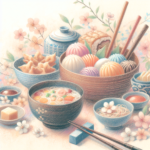The Harmony of Flavor and Faith: How Japanese Cuisine Celebrates Nature and Spirituality
Japanese cuisine goes beyond just being a means of nourishment; it deeply reflects the harmony with nature and spirituality. At its core lies an appreciation for the natural world, cultivated through centuries of tradition and cultural practices. From the selection of ingredients to the cooking techniques and plating, the Japanese are committed to honoring their environment in every aspect of their culinary creations.
In Japan, seasonal change is pivotal, with an emphasis on utilizing seasonal ingredients. The spring brings treats like wild plants and sakura shrimp, summer offers river fish and tomatoes, autumn showcases matsutake mushrooms and chestnuts, while winter introduces daikon and various seafood. Incorporating these seasonal delicacies allows each dining experience to resonate with the beauty of nature, enabling diners to savor the essence of each season in every bite.
Moreover, the spiritual significance embedded in seasonings and ingredients adds another layer of appeal in Japanese cuisine. Consider miso soup, a staple that graces many dining tables daily. Miso, being a fermented product, is lauded for its health benefits and ties to longevity. This showcases that meals serve not just as energy sources but as vital components to cultivate balance within the mind and body.
The Sacred Process of Cooking
In Japan, the act of cooking is often viewed as a sacred practice. The phrase “itadakimasu” encapsulates a sense of gratitude towards the ingredients and the nature that nurtured them. This sentiment permeates the cooking process, particularly when young chefs learn traditional techniques from their masters, who impart not just recipes but also a profound respect and affection for the ingredients.
Take, for instance, a sushi chef, whose meticulous attention to the art of sushi-making transcends merely creating delicious food. The chef’s dedication is about enriching the dining experience, fostering an appreciation of life itself. At the moment of “itadakimasu,” diners can sense the chef’s intentions and the respect for the suppliers, creating a shared spirit between the meal and those who partake in it.
In Japan, there is a philosophy surrounding cooking that enhances the experience. It’s not only about tasting with the palate but also feeling with the heart, intertwining a philosophy of spirituality and a deep appreciation for the culinary art.
Utilizing Ingredients in Harmony with Nature
Japanese cuisine emphasizes local ingredients, underscoring the connection to the land and honoring local culture. By making full use of regional specialties, such as traditional vegetables from Kyoto or Koshihikari rice from Niigata, the meals embody the essence of their surroundings. These dishes emphasize that food is not merely sustenance; it is entwined with history and local practices.
Additionally, the presentation of vegetables and how they are cut reflect Japanese design principles. Meals are crafted to be visually pleasing, with an emphasis on the natural colors and forms of the ingredients. By preserving their natural shapes, diners can appreciate the beauty of nature, enhancing their visual experience.
Also, the arrangement and color of the food play significant roles in the presentation. By considering the nutritional value and health effects of each ingredient, the careful assembly fosters an overall balance in the meal, embodying the pursuit of both mental and physical well-being that is characteristic of the Japanese people.
The Spiritual Aspects of Japanese Cuisine
Spiritual elements are prolific in Japanese cuisine, epitomized by the concept of omotenashi, which emphasizes hospitality and care for guests. This mindset fosters deeper connections between people, serving as a medium for expressing gratitude. On special occasions and celebrations, auspicious ingredients symbolize good fortune and prosperity, reinforcing an essential bond between meals, culture, and spirituality.
A prime example would be osechi ryori, the traditional New Year’s feast where each dish bears a specific meaning, made with the hope of family health and prosperity. Dishes served during seasonal festivities are intricately linked to religious and cultural rituals, illustrating how food not only nourishes but also perpetuates traditions.
Food crafted with care transcends mere meals; it becomes a tapestry of memories and culture for many. The emotions infused in cooking touch the diners, leaving a lasting warmth and connection.
Conclusion: The Essence and Universality of Japanese Cuisine
The essence of Japanese culinary culture artfully intertwines nature, spirituality, and gratitude. Food serves not only biological needs but also provides nourishment for the soul, enriching daily life with new discoveries and appreciations.
Through Japanese cuisine, individuals can reconnect with the ingredients, nature, and their relationships with others. In a modern age where food culture is primarily dominated by convenience, rediscovering these integral traditional elements highlights a pathway toward a brighter future. Thus, it becomes essential to explore Japanese cuisine to cultivate inner harmony and to embrace the profound spiritual experiences it offers.


